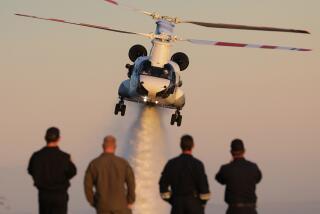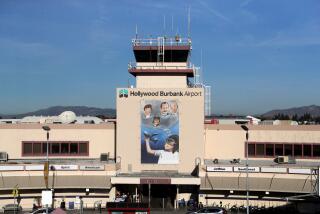Burbank flight ban rejected
- Share via
Federal officials on Monday dealt a serious blow to a decades-long effort to restrict nighttime flights at Bob Hope Airport in Burbank, asserting that to do so would harm the national air transportation system.
The Federal Aviation Administration rejected a proposed curfew that would have banned flights by airlines, cargo operators, charter services and private pilots between 10 p.m. and 6:59 a.m. with some exceptions, including emergencies.
The airlines now operate under a voluntary agreement not to fly between those hours.
In a 42-page ruling, FAA officials concluded that the restriction was “not reasonable” because it would “create an undue burden on commerce.” They said that other measures, such as soundproofing homes, are available for reducing aircraft noise in nearby neighborhoods.
Bob Hope, which is operated by the Burbank-Glendale-Pasadena Airport Authority, is home to 15 air carriers as well as private aircraft. In 2008, it served about 5.3 million commercial passengers and had about 120,000 takeoffs and landings.
“We are disappointed, but we have not given up the fight,” said Joyce Streator, president of the airport commission, which plans to review the FAA decision as well as options for challenging the ruling.
Local officials have fought for years to reduce aircraft noise for about 180,000 residents in Burbank, Glendale and Los Angeles who live along the airport’s southwest departure routes. In 1973, the U.S. Supreme Court weighed in, striking down a Burbank ordinance banning overnight takeoffs.
The current proposal has become the focal point of one of the most acrimonious homeowner battles in the San Fernando Valley out of fear that the curfew would shift flights from Bob Hope to Van Nuys Airport, increasing the noise problem there.
Since 2000, the airport authority has spent about $7 million to study the night curfew and submit the proposed restriction to the FAA for approval. A formal application was made in February.
The research indicated that between 2008 and 2015, the restrictions would generate about $67 million in benefits for the public and $48 million in costs to airlines, passengers, cargo carriers and general aviation.
The benefits of the curfew would include increased property values, lower costs for noise abatement and a decrease in noise. The costs to passenger and cargo carriers would result from the elimination of night flights, canceling delayed flights and transferring some operations to other airports.
In Washington, D.C., Reps. Adam Schiff (D-Burbank) and Brad Sherman (D-Sherman Oaks) said they would consider legislation as a way around the FAA, including nighttime restrictions for Bob Hope and Van Nuys.
The proposed restrictions ran into political opposition from FedEx, United Parcel Service and other cargo companies and trade groups who said the airport exaggerated the noise problem.
dan.weikel@latimes.com
More to Read
Sign up for Essential California
The most important California stories and recommendations in your inbox every morning.
You may occasionally receive promotional content from the Los Angeles Times.















